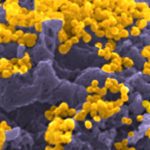Lien vers Pubmed [PMID] – 36679857
Lien DOI – 1210.3390/vaccines11010012
Vaccines (Basel) 2022 Dec; 11(1):
Following the breakthrough of numerous severe acute respiratory syndrome coronavirus 2 (SARS-CoV-2) variants in recent months and the incomplete efficiency of the currently available vaccines, development of more effective vaccines is desirable. Non-integrative, non-cytopathic and non-inflammatory lentiviral vectors elicit sterilizing prophylaxis against SARS-CoV-2 in preclinical animal models and are particularly suitable for mucosal vaccination, which is acknowledged as the most effective in reducing viral transmission. Here, we demonstrate that a single intranasal administration of a vaccinal lentiviral vector encoding a stabilized form of the original SARS-CoV-2 Spike glycoprotein induces full-lung protection of respiratory tracts and strongly reduces pulmonary inflammation in the susceptible Syrian golden hamster model against the prototype SARS-CoV-2. In addition, we show that a lentiviral vector encoding stabilized Spike of SARS-CoV-2 Beta variant (LV::SBeta-2P) prevents pathology and reduces infectious viral loads in lungs and nasal turbinates following inoculation with the SARS-CoV-2 Omicron variant. Importantly, an intranasal boost with LV::SBeta-2P improves cross-seroneutralization much better in LV::SBeta-2P-primed hamsters than in their counterparts primed with an LV-encoding Spike from the ancestral SARS-CoV-2. These results strongly suggest that an immune imprint with the original Spike sequence has a negative impact on cross-protection against new variants. Our results tackle the issue of vaccine effectiveness in people who have already been vaccinated and have vanished immunity and indicate the efficiency of LV-based intranasal vaccination, either as a single dose or as booster.

